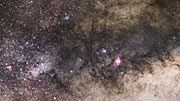Pressmeddelande
Trifidens trefaldiga töcken
26 augusti 2009
ESO har släppt en ny bild av Trifidnebulosan som visar varför den är en favorit bland både proffs- och amatörastronomer. Denna jättelika stjärnfabrik, som har fått sitt namn av de mörka stoftband som delar dess glödande hjärta i tre delar, utgör en sällsynt kombination av tre olika nebulosatyper. I Trifiden avslöjas nytända stjärnors starka sken och skvallrar om ännu ofödda generationer av stjärnor.
På flera tusen ljusårs avstånd i Skyttens stjärnbild, ger den glödande Trifidnebulosan en fängslande bild av stjärnornas tidiga livsstadier, från stjärnfoster till de första ljusstrålarna. Hettan och vinden från nytända och oberäkneliga stjärnor, rör om i Trifidens gas- och stoftfyllda gryta. Med tiden kommer materian i de mörka stråk som ligger utströdda i området, att dra ihop sig och bilda nya stjärnor.
Den franske astronomen Charles Messier observerade Trifidnebulosan första gången i juni 1764 och gav det dimmiga objektet nummer 20 i sin berömda katalog. Det var dock först 60 år senare som John Herschel lade märket till de mörka stoftstråken som tycks dela det kosmiska molnet i tre och som fick den engelske astronomen att hitta på namnet ”Trifiden”.
Denna nya bild är tagen med WFI-kameran (Wide-Field Imager), monterad på det 2,2 meters MPG/ESO-teleskopet vid ESO:s La Silla-observatorium i norra Chile, och visar upp Trifidnebulosans olika delar så som de framträder i synligt ljus. Den blåaktiga fläcken uppe till vänster är en så kallad reflektionsnebulosa. Där sprids ljuset från näraliggande stjärnor, födda i Trifiden, av dammiga gasmoln. Den största av dessa stjärnor lyser starkast i det heta blåa området av det synliga spektrumet. Om man lägger till det faktum att stoftkorn och molekyler sprider blått ljus mer effektivt än rött ljus – en egenskap som förklarar både blåa himlar och röda solnedgångar – skänker denna stjärna Trifidnebulosan en blåskimrande nyans.
Längre ner, i den runda, rödrosa området som är typiskt för en emissionsnebulosa, hettas gasen i Trifidens kärna upp av hundratals brännheta, unga stjärnor tills den lyser i rött. Färgen beror på vätgasen som utgör dess viktigaste del och det röda skenet skapas på ungefär samma sätt som ljuset i våra röda neonskyltar här på jorden.
Gas- och stoftbanden som skär kors och tvärs över Trifidnebulosan utgör den tredje typen av nebulosa i detta kosmiska moln. De mörka nebulosorna kallas så på grund av deras förmåga att skymma ljus. (Mest känd bland de mörka nebulosorna är nog Hästhuvudnebulosan [ESO:s pressfoto 02/02].) Inuti dessa mörka stråk fortsätter lämningar efter tidigare stjärnfödslar att samlas under gravitationens oemotståndliga dragningskraft. Ökande tryck, tilltagande täthet och stigande temperatur inuti dessa gasbubblor kommer så småningom att utlösa kärnreaktioner och ännu fler stjärnor kommer att bildas.
I nebulosans nedre del sticker ett finger av gas ut från molnet och pekar direkt mot den stjärna som är Trifidens kraftkälla. Detta är ett exempel på en så kallad avdunstande gasglobul, något som även framträder i Örnnebulosan, ett annat stjärnbildningsområde. Längst ut på detta finger, som framträder i bilder tagna med Hubbleteleskopet, har en knut av tät gas stått emot den obarmhärtiga strålningen från den tunga stjärnan.
Mer information
ESO, Europeiska sydobservatoriet, är Europas främsta mellanstatliga organisation för astronomisk forskning och världens mest produktiva astronomiska observatorium. Det stöds av 14 länder: Belgien, Danmark, Finland, Frankrike, Italien, Nederländerna, Portugal, Schweiz, Spanien, Storbritannien, Sverige, Tjeckien, Tyskland och Österrike. ESO:s ambitiösa verksamhet rör design, konstruktion och drift av kraftfulla markbaserade forskningsanläggningar som gör det möjligt för astronomer att göra viktiga vetenskapliga upptäckter. ESO spelar dessutom en ledande roll i att främja och organisera samarbeten inom astronomisk forskning. ESO driver tre unika observationsplatser i Chile: La Silla, Paranal och Chajnantor. Vid Paranal driver ESO Very Large Telescope, världens mest avancerade observatorium för synligt ljus, och VISTA, det största kartläggningsteleskopet. ESO är den europeiska partnern i ALMA, ett revolutionerande astronomiskt teleskop och det största astronomiska projekt som finns. ESO planerar för närvarande ett 42-meters europeiskt extremt stort teleskop för synligt och infrarött ljus, E-ELT, som kommer att bli ”världens största öga mot himlen”.
Kontakter
Henri Boffin
ESO
Garching, Germany
Tel: +49 89 3200 6222
E-post: hboffin@eso.org
Johan Warell (Presskontakt för Sverige)
ESO:s nätverk för vetenskaplig kommunikation
Skurup, Sverige
Tel: +46-706-494731
E-post: eson-sweden@eso.org
Om pressmeddelandet
| Pressmeddelande nr: | eso0930sv |
| Legacy ID: | PR 30/09 |
| Namn: | Trifid Nebula |
| Typ: | Milky Way : Nebula : Type : Star Formation |
| Facility: | MPG/ESO 2.2-metre telescope |
| Instruments: | WFI |



